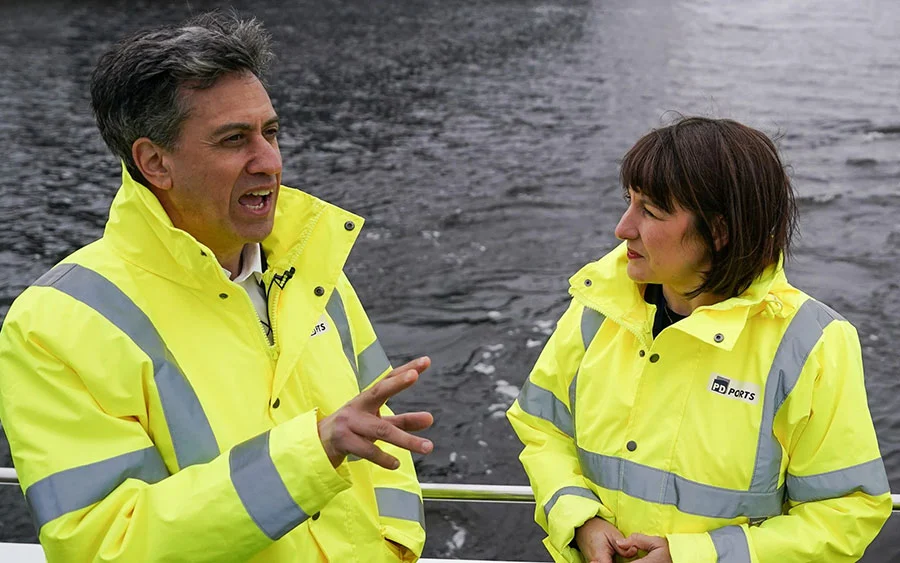Rachel Reeves has suggested Labour will soften its crackdown on North Sea oil in a blow to Ed Miliband’s net zero ambitions.
Speaking at Labour’s annual conference, the Chancellor pledged to support “homegrown energy” and said this included oil and gas extracted from the North Sea.
Mr Miliband, the Energy Secretary, is under increasing pressure to water down a proposed ban on North Sea oil and gas licences amid Britain’s increasing dependency on costly imports from abroad.
Last week it emerged that Mr Miliband was considering weakening the ban by allowing energy companies to drill new oil and gas fields adjacent to existing ones.
In a speech to businesses on Monday night, Ms Reeves said: “I talked about homegrown energy, and that is renewables but it is also in the North Sea as well.
“Ahead of the Budget, we should be publishing our North Sea strategy, which I hope will give some certainty to [the sector] to be able to invest in the UK.
“We are going to be reliant on oil and gas for many years to come, and I would prefer us to be using oil and gas from the UK than importing in from overseas.”
During the discussion on Monday, Ms Reeves told executives she was “not a zealot of green energy”, adding: “I am really committed to boosting our energy security, because increasingly energy security is national security, so investing in homegrown energy is really important.”
Exploration of the North Sea continues despite the Government’s plan to stop drilling. Shell said on Tuesday that it had opened a major new gas field west of Shetland, which at its peak will have enough capacity to supply around 2pc of the UK’s homes and businesses.
However, along with the Government’s imposition of a higher windfall tax and uncertainty over whether major developments such as the Jackdaw and Rosebank fields will be approved, Mr Miliband’s proposed licencing ban has been blamed for accelerating an exodus of companies from the North Sea.
Pressure grows on Miliband
Ms Reeves’s intervention is the latest sign of the pressure mounting on the Energy Secretary to change course after Donald Trump also lobbied Sir Keir Starmer during his state visit this month.
The US president repeatedly urged Sir Keir to “drill, baby, drill”, echoing his own policies at home, and told the Prime Minister, “You have a great asset here. North Sea oil is phenomenal.”
Mr Trump’s comments partly reflected the concerns of American companies including Apache and ExxonMobil that are pulling out of the North Sea owing to Labour’s policies, one industry insider said.
Mr Miliband’s allies have argued in the past that there remains plenty of licenced oil and gas reserves in the North Sea and that a ban on future development should make little real difference, given the basin’s declining status.
But oil and gas executives argue that Labour’s policies have accelerated the decline, killing off investment prematurely.
The Treasury has also been warned by experts that triggering the closure of rigs earlier could lead to lower tax revenues than expected, as decommissioning begins and companies claim tax reliefs.
Shell’s Victory
Shell announced the start of production at the Victory field in the North Sea on Tuesday as part of a joint venture with Norwegian giant Equinor.
The site’s peak production is expected to reach around 150 million standard cubic feet per day at full capacity, which is enough to heat roughly 900,000 homes per year.
It is expected to be emptied by the end of the decade.
According to the North Sea Transition Authority, domestic gas production has fallen by 10pc in the last year while nearly two thirds of the UK’s gas was imported.
Simon Roddy, of Shell UK, said: “Gas fields like Victory play a crucial role in the UK’s energy security, and the country will rely on them for decades to come.
“They provide an essential fuel we need now, and act as a partner to intermittent renewables as we move through the energy transition.
“By developing fields like Victory next to existing infrastructure, we are making sure our production in the UK North Sea remains cost competitive and reduces operational emissions.”
“Join the companies that smart energy professionals follow – because when you’re featured on OGV, the industry pays attention.”
